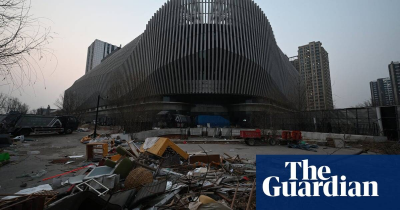The Guardian - China-Evergrande collapse means foreign investors in China face even greater uncertainty
January 30, 2024 4 min 699 words
这则报道深刻揭示了中国房地产开发商恒大的崩溃对投资者、债权人和数以千计为购房支付订金的居民所带来的巨大不确定性。恒大市值在2017年峰值的基础上已经下降99%,欠债超过3000亿美元。香港高等法院的强硬判决表明公司“极度资不抵债”,下一步将是执行该判决,而债权人排队等候的情况可能持续数月。 恒大可提起上诉,但其90%以上的资产位于中国内地,与香港法域不同,对于判决是否会在内地生效尚不清晰。这意味着包括提出清盘申请的Top Shine Global在内的外国债券持有人将面临“置之不理”的境地,中国政府不太可能出手救援。 此次事件对于外国公司是否愿意继续在中国投资具有重要影响。分析人士认为,尽管对于中国未来投资决策的影响仍有待观察,但当前的氛围已经相对中性。但恒大危机是否会对曾是中国房地产业明珠的公司产生更广泛的金融系统影响,成为当前关注的问题。在中国政府将三家大型债务管理机构并入主权财富基金的举措中,一些分析人士指出,北京更倾向于主导金融机构的重组,而非救助或向债权人支付。 这一切将直接关系到那些为恒大已停工项目支付订金的购房者,对于这些人来说,恒大资产的未来将成为一个极为重要的问题。在一个将近三分之三的家庭财富与房地产相关的国家,数以百万计的普通中国人可能将面临他们的积蓄即将消失的风险。
As China’s most embattled – and indebted – property developer is ordered to liquidate, the effects that Evergrande’s collapse will have on investors, debt holders and the hundreds of thousands of homebuyers who have paid deposits for homes remains uncertain.
Evergrande, the Chinese property developer, was worth just $275m on Monday, down 99% from its peak in 2017. It owes more than $300bn to various creditors, according to its most recent financial report.
In a scathing judgment delivered in Hong Kong’s high court on Monday, Justice Linda Chan said “enough is enough”.
“It is indisputable that the company is grossly insolvent and is unable to pay its debts,” Chan wrote, as she ordered the company to liquidate its assets.
But enforcing that order will be the next challenge and the queue of creditors who are lining up is likely to remain for many months.
Evergrande can still appeal against Monday’s ruling. More importantly, over 90% of its assets – which include more than 1,300 housing projects in 280 cities – are in mainland China, a separate jurisdiction from Hong Kong, where it is far from clear if Justice Chan’s order will be enforced.
“Good luck enforcing,” says Anne Stevenson-Yang, founder of J Capital research. She recalled that when Kaisa, another Chinese property developer, defaulted on its debts in 2015, local governments in China took control of Kaisa developments and renamed them, in some cases physically barring Kaisa staff from accessing the properties.
This means that foreign bondholders – including Top Shine Global, which brought the winding-up petition against the Evergrande – will be “hung out to dry”, says George Magnus, an economist and associate at Soas University of London.
And a bailout is unlikely. The Chinese government “certainly don’t want to give priority to making good the losses of foreign creditors over domestic citizens,” says Magnus. “That just wouldn’t be a good look. So to the extent that somebody is going to pay a price, it will be the foreign bondholders.”
With tumbling Hong Kong and Chinese stock markets, a predictable commercial insolvency process is an important pillar in determining whether or not foreign companies will want to continue investing in China. It will be the steps taken by Beijing that will shape the extent to which foreign investors can feel confident that their investments into Chinese companies will be treated fairly.
But many analysts believe that the mood music for this has already been set.
“To the extent that companies have been gradually and gingerly shying away from future investment decisions in China … [Evergrande’s impact] is pretty neutral,” said Magnus.
The question now is whether or not the crisis for the company that was once the jewel of China’s property sector will have repercussions throughout the wider financial system.
Analysts have warned against predictions of China’s “Lehman moment”, when the bankruptcy of Lehman Brothers bank in 2008 became a crisis for the US economy. Experts at China Beige Book, a financial research firm, said that “contagion is near impossible” because Beijing maintains a tight control over the wider financial system.
On Sunday, Chinese state media reported that the government plans to merge three of the country’s biggest debt managers into the sovereign wealth fund, China Investment Corp, a move that analysts have pointed to as an example of Beijing taking over the restructuring of financial institutions rather than bailing them out or paying out to creditors.
Evergrande can still challenge Justice Chan’s decision. The company’s executive director called the judgment “regrettable” but said that operations would continue in mainland China, according to the BBC.
That will matter to the many homebuyers who have made down payments on properties on which Evergrande has halted construction. In 2021, when Evergrande’s troubles first emerged, some 1.6 million homebuyers were in limbo as the company had taken their deposits without delivering their homes.
In a country where nearly three-quarters of household wealth is tied to property, the future of Evergrande’s assets will be a major concern for the hundreds of thousands of ordinary Chinese whose nest eggs may be about to disappear.

